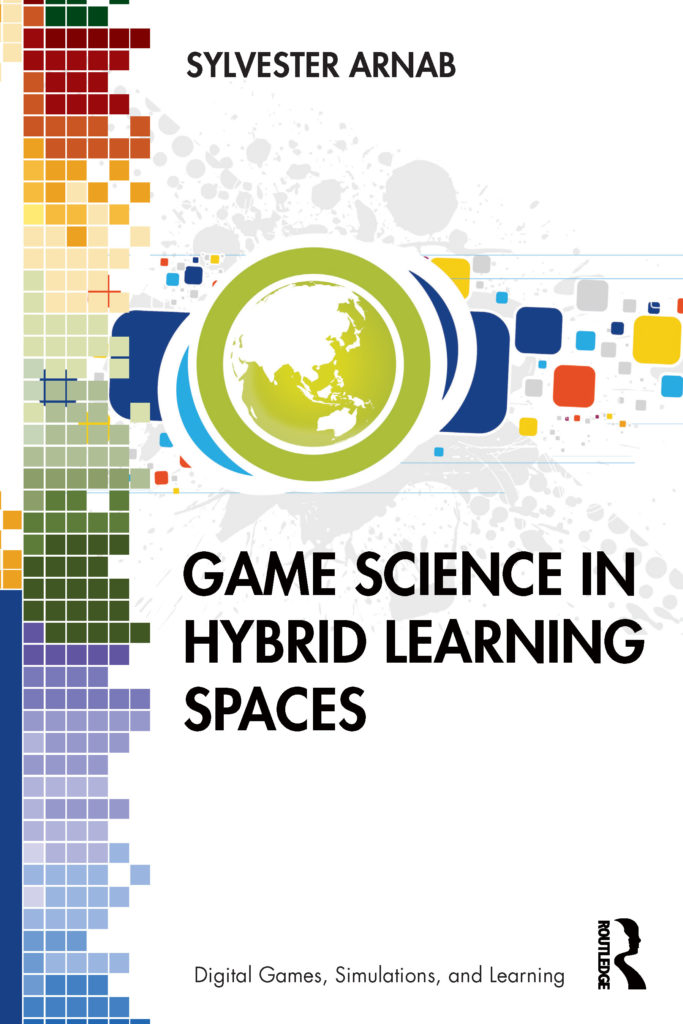Hybridity, Playfulness, and Game-Based Pedagogy
by Sylvester Arnab
Hybridity at the Speed of Need

Technology and new ways of working change and advance at a rapid pace making it challenging for educational systems to keep up and continue to update at a similar pace. The pandemic further presents a great challenge to teaching and learning globally. The immediate response has been the mobilisation of digital online learning to ensure remote education access at home. The sudden transition to technology-delivered instruction has been disconcerting for educators and learners alike. As the world starts to open up, it is essential for us to reflect on the experience of configuring and reconfiguring teaching and learning experiences across the various modalities. Were they at the speed of need? One of the main challenges posed by this sudden change is whether meaningful learning experiences can still be facilitated on online platforms. Putting learners at the heart of the agenda, it is essential to ensure that their learning experiences are configured and reconfigured as and when it is needed for supporting their growth in their learning process, aligning with the ‘hybrid learning’ perspective. “With the perspectives of learning at the speed of need across different spatial, contextual, and material modalities, and the blending of these modalities, hybrid learning proposes a more pragmatic and holistic approach for finding the right combination out of all modalities, whether they are offline or online, digital or analogue, passive or experiential, formal or informal…” [01].
When education blends seamlessly into our daily lives and vice versa, the world becomes our biggest playground for exploration, experimentation and meaning making. As pedagogical paradigms are continuously evolving, in response to the shift in socio- cultural, economic, and technological landscapes, learners are expected to be more self-regulated, agentic, and empathic in the way they author and navigate their learning experiences. As experiential learning is brought to the forefront, educators are now creators, agents, and facilitators of change, nudging and nurturing attitude, aptitude, and behaviour that will prepare learners for the realities of tomorrow’s world.
The Fourth Industrial Revolution will of course expect competencies and capabilities in emerging technologies. However, technologies will be ever- changing and evolving, thus requiring a more holistic and human-centred approach for learners to develop inter and transdisciplinary skills towards becoming active lifelong learners. Learners will need to adapt, innovate and be responsive to the changing world and contribute to innovative economies and resilient societies.
Educators thus play a critical role in embedding these perspectives in their pedagogical practices as they are the direct means for addressing the targets of equitable and inclusive quality education. Educators should be empowered to redesign and reimagine their practices, inspired by new pedagogical approaches. The educational landscape will continue to change and evolve as pedagogy is shifting from traditional didactics to more hands-on activities and from more hands-on activities to highly connected experiences[02].
Experiential Learning through Play and Gameplay
Education is becoming more experiential, shifting away from the passive and conventional teaching that emphasises on information transmission and memory. Learners should be engaged with new and creative ways of being and doing, providing them with opportunities to safely envision themselves in roles and situations that will help them to contextualise their learning and aspirations. Learning-by-doing includes reflection and collaboration [03], favouring active dialogue, inquiry-based, creative, and learner- centred approaches that can be facilitated via playful and gameful pedagogy.
Play and gameplay promote the autonomy and agency for learners to engage with, develop curiosity about, and learn from the world and people around them in positive ways[04]. The use of playful and gameful pedagogical practices provides such experiential means for a learning process to be facilitated, attitudes and behaviours to be nurtured, and relevant competences and capabilities to be acquired. The experiential aspects can be achieved through constructed/simulated or realistic game and game-like environments across the spatial, temporal, and social modalities, enabling learners to experience various scenarios, apply their knowledge and skills, and reflect on their learning.
Gaming is a culturally accepted activity worldwide with a growing relevance in education because games broaden and extend what traditional teaching methods could facilitate. As gaming technology evolves, the danger is that people will get very excited and highly driven by new opportunities to leverage their didactics and content onto the next trendy development. There is nothing wrong with this at all. However, there is a need for a hybrid approach for focusing on what experience would best benefit the learners as well as the educators. Games and gameplay provide insights into the mechanics, dynamics and aesthetics of engagement and participation in experiences that encourage learners to act, make decision and reflect, nurturing a life-long learning practice that will guide them in future inquiries.
Learners should also be offered the options to not just passively consume and experience but to also create contents and experiences. The use of games and gameplay in education also extends to the use of the game design and making process as an educational practice. Designing and creating games and game- like systems, as an activity on the edge of the diverse disciplines, is a fertile ground to cultivate creative and innovative mind-sets, providing space for learners to learn how to fruitfully cooperate. Game-making as an empathic and agentic learning process can foster competencies such as (co)creativity, problem-solving, and social-emotional skills. When creating games for addressing serious issues or topics, learners will be able to apply knowledge and skills creatively in problem-solving and develop team working and communication skills.
Learners who experience autonomy and agency in learning are fully engaged and immersed in an educational process. Autonomy and agency are key attributes of playfulness that is a characteristic of hybridity in open education for broadening access to education for those wanting to learn. Games, whether they are analogue, digital, or pervasive enable play and, intended and incidental learning through gameplay. Games are valuable means through which play can be observed and facilitated in a more objective way, which can lead to purposeful and meaningful engagement, and actionable feedback and reflection.
Hybridity in Play and Game-Based Pedagogy

Hybrid learning is not techno-deterministic but is dependent on the intended experiences and their contexts, which are central to the choice of instruments that enable these experiences to happen. Hybridity within the context of learning through playful and gameful approaches fundamentally proposes a rethink of our conception and contextualisation of learning spaces, contexts, and materials, and how learners /engagement is sustained within the learning process. Learners are encouraged to test, apply, iterate, and increment their knowledge and skills in a safe environment, where “failures” are seen as opportunities for developing resilience and persistence. Learners can reflect on their experiences, arrive at new conclusions, and think about how they would apply these conclusions in civic participation and the world of work.
When using playful and gameful resources, the configuration of the learning experience must consider a complete programme of ‘intervention’. For instance, game-based pedagogy as an educational intervention should include self and group reflections, which enrich and deepen the learning experience. Educators can facilitate reflective dialogues and group discussion/ de-briefing to enhance clarity and enrich the playful learning experience for building understanding without direct instruction or interference, promoting the learners’ sense of autonomy and agency. Knowledge and skills are constructed, and a creative inquiry process is facilitated through social constructivism[05]. Constructivism suggests that individuals learn through active exploration and that learning occurs within a social context between learners and their peers.
By traversing learning scenarios scaffolded through play and game-based activities, learners benefit from the transferability of the metacognition process into practices in their day to day lives, including their formal education, informal learning, and social interactions. A metacognition process is “…a reflective process, where learners constantly monitor and evaluate their progress during problem-solving. Learners can reflect on whether their current level of understanding is sufficient, often occurs in formal and informal settings throughout their lifetime” Arnab [01], nurturing intrinsic motivation in the learning process. Such motivation to solve problems often links to the concept of “hard fun” [06], where engaging with optimal challenges towards experiencing mastery leads to positive engagement in problem-solving activities. The need for competence often leads learners and players alike to “seek challenges that are optimal for their capacities and to persistently attempt to maintain and enhance those skills and capacities through activity”[07].
The spaces, contexts, and materials to facilitate such learning should be configured at the speed of need, which requires a more empathic approach in understanding and responding to the needs of the learners as both educators and learners navigate through the learning journey. The hybrid learning perspective is key here for providing permission to experiment, explore, reflect, and iterate the direction of learning, mirroring the agentic characteristics of play and gameplay.
Are We Game for Tomorrow’s World?
Hybrid learning concerns connected experiences that contextualise education that is not defined, driven nor restricted by specific technologies and/or pedagogies. It is a practice that is established in a more holistic, empathic, and inclusive manner. The localised needs of the learners and the situational relevance of the approach should be considered to allow learners to have the autonomy and agency in discovering meaningful relationships between abstract ideas, practical applications, and the value of knowledge in the context of the real world. Concepts are internalised via the process of discovering, reinforcing, and relating. The hybrid perspective argues that playful and gameful approaches enable, facilitate, and afford experiential, creative, and exploratory environments for engaging learners as well as educators with the application of real-world contexts into the teaching and learning process. Learners engage in hands-on enquiry, creative designs, and open-ended exploration. Using play and gameplay as the mechanics of learning can promote the transition from knowledge acquisition to participation as well as the recognition and discovery of values in the learning experience, which can be social, cultural, economic, environmental, and so forth. The configuration of learning experiences can align with the key aspects of 21st Century learning, i.e., ‘to know’ (foundational knowledge), ‘to act’ (meta knowledge) and ‘to value’ (humanistic knowledge). Not only is education essential for developing knowledge and skills, but it is also important for nurturing attitudes and values that will enable learners to contribute to and benefit from an inclusive and sustainable future.
